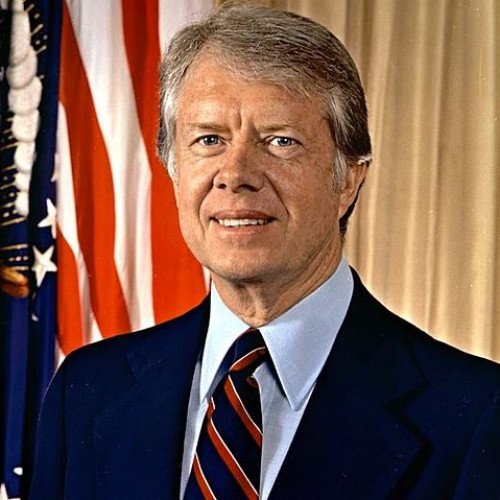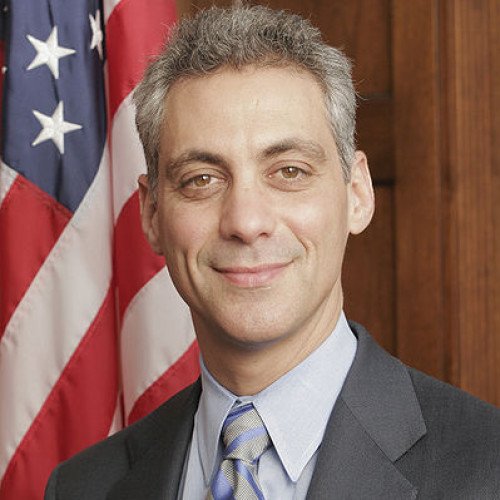Jimmy Carter VS Rahm Emanuel

Jimmy Carter
James Earl Carter Jr. (born October 1, 1924) is an American politician and philanthropist who served as the 39th president of the United States from 1977 to 1981. A member of the Democratic Party, he previously served as a Georgia State Senator from 1963 to 1967 and as the 76th governor of Georgia from 1971 to 1975. Since leaving the presidency, Carter has remained engaged in political and social projects as a private citizen. In 2002, he was awarded the Nobel Peace Prize for his work in co-founding the Carter Center. Raised in Plains, Georgia, Carter graduated from the United States Naval Academy in 1946 with a Bachelor of Science degree and joined the United States Navy, where he served on submarines. After the death of his father in 1953, Carter left his naval career and returned home to Georgia to take up the reins of his family's peanut-growing business. Carter inherited comparatively little due to his father's forgiveness of debts and the division of the estate among the children. Nevertheless, his ambition to expand and grow the Carters' peanut business was fulfilled. During this period, Carter was motivated to oppose the political climate of racial segregation and support the growing civil rights movement. He became an activist within the Democratic Party. From 1963 to 1967, Carter served in the Georgia State Senate, and in 1970, he was elected as Governor of Georgia, defeating former Governor Carl Sanders in the Democratic primary on an anti-segregation platform advocating affirmative action for ethnic minorities. Carter remained as governor until 1975. Despite being a dark-horse candidate who was little known outside of Georgia at the start of the campaign, Carter won the 1976 Democratic presidential nomination. In the general election, Carter ran as an outsider and narrowly defeated incumbent Republican President Gerald Ford. On his second day in office, Carter pardoned all the Vietnam War draft evaders by issuing Proclamation 4483. During Carter's term as president, two new cabinet-level departments, the Department of Energy and the Department of Education, were established. He established a national energy policy that included conservation, price control, and new technology. In foreign affairs, Carter pursued the Camp David Accords, the Panama Canal Treaties, the second round of Strategic Arms Limitation Talks (SALT II), and the return of the Panama Canal Zone to Panama. On the economic front, he confronted stagflation, a persistent combination of high inflation, high unemployment and slow growth. The end of his presidential tenure was marked by the 1979–1981 Iran hostage crisis, the 1979 energy crisis, the Three Mile Island nuclear accident, and the Soviet invasion of Afghanistan. In response to the invasion, Carter escalated the Cold War when he ended détente, imposed a grain embargo against the Soviets, enunciated the Carter Doctrine, and led a 1980 Summer Olympics boycott in Moscow. In 1980, Carter faced a challenge from Senator Ted Kennedy in the primaries, but he won re-nomination at the 1980 Democratic National Convention. Carter lost the general election to Republican nominee Ronald Reagan in an electoral landslide. He is the only president in American history to serve a full term of office and never appoint a justice to the Supreme Court. Polls of historians and political scientists usually rank Carter as a below-average president. Carter's activities since leaving the presidency have been viewed more favorably than his presidency itself. In 1982, Carter established the Carter Center to promote and expand human rights. He has traveled extensively to conduct peace negotiations, monitor elections, and advance disease prevention and eradication in developing nations. Carter is considered a key figure in the Habitat for Humanity charity. He has written over 30 books, ranging from political memoirs to poetry, while continuing to actively comment on ongoing American and global affairs such as the Israeli-Palestinian conflict.
Statistics for this Xoptio

Rahm Emanuel
Rahm Israel Emanuel (; born November 29, 1959) is an American politician who served as the 55th mayor of Chicago from 2011 to 2019. A member of the Democratic Party, he previously served as the 23rd White House Chief of Staff from 2009 to 2010, and as a member of the United States House of Representatives from Chicago between 2003 and 2009. Born in Chicago, Emanuel is a graduate of Sarah Lawrence College and Northwestern University. Working early in his career in Democratic politics, Emanuel was appointed as director of the finance committee for Bill Clinton's 1992 presidential campaign. In 1993, he joined the Clinton administration, where he served as the assistant to the president for political affairs and as the Senior Advisor to the President for policy and strategy. Beginning a career in finance, Emanuel worked at the investment bank Wasserstein Perella & Co. from 1998 for 2½ years, and served on the board of directors of Freddie Mac. In 2002, Emanuel ran for the seat in the U.S. House of Representatives vacated by Rod Blagojevich, who resigned to become governor of Illinois. Emanuel won the first of three terms representing Illinois's 5th congressional district, a seat he held from 2003 to 2009. As the chair of the Democratic Congressional Campaign Committee, he oversaw Democratic wins in the 2006 United States House of Representatives elections, allowing the party to gain control of the chamber for the first time since 1994. After the 2008 presidential election, President Barack Obama appointed Emanuel to serve as White House chief of staff. In October 2010, Emanuel resigned as chief of staff to run as a candidate in Chicago's 2011 mayoral election. Emanuel won with 55% of the vote over five other candidates in the non-partisan mayoral election, succeeding 22-year incumbent Richard M. Daley. At his reelection, although Emanuel failed to obtain an absolute majority in the February 2015 mayoral election, he defeated Cook County board commissioner (and later U.S. Representative) Jesús "Chuy" García in the subsequent run-off election in April. In late 2015, Emanuel's approval rating plunged to "the low 20s" in response to a series of scandals. These followed and were attributed to the police shooting of 17-year-old Laquan McDonald, the city's subsequent attempts to withhold a video of the shooting, and the lack of an investigation into the matter. Emanuel initially announced in October 2017 he planned to run for a third term, but on September 4, 2018, he reversed his decision and announced that he would not seek a third term due to personal obligations. The Chicago Tribune assessed Emanuel's performance as mayor as "mixed." At one point, half of Chicagoans favored Emanuel's resignation. He later made steady progress in recovering his political support. He left office in May 2019 and was succeeded by Lori Lightfoot.